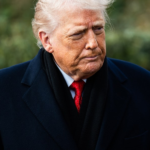U.S. supremacy in financial markets is already at risk as President Donald Trump wages his trade war, and Wall Street is warning the Supreme Court could threaten it further.
While justices gave the Federal Reserve some protection, the Supreme Court’s stance in favor of more executive power could make the U.S. less attractive, analysts said.
“The Court’s order suggests they’ll likely support expanded presidential power in upcoming decisions, giving credence & support to the Unitary Executive Theory,” the note said. “We believe expanded Presidential power is bearish for risk assets & will further erode the concept of American exceptionalism in markets.”
The Unitary Executive Theory argues that the president has sole authority within the executive branch. That means that not only does the White House have the ability to fire agency heads, it can also impound money allocated by Congress.
Both agencies are considered independent, meaning members serve until their terms are up and can only be removed for issues such as misconduct or breach of duty.
“We believe that the most important, structural changes in how the US Government functions will be decided by the US Supreme Court on questions related to executive power and executive authority,” the Jefferies analysts said.
In addition to the removal of leaders of independent agencies, interpreting presidential powers more broadly also has implications for imposing tariffs, firing federal workers, and deregulating the economy outside traditional mechanisms, the note pointed out.
“We believe that Thursday’s Supreme Court order portends expanded executive power, in line with the Unitary Executive Theory, which will lead to investors putting a higher risk premium on US assets going forward, due to increased policy variability,” Jefferies warned.
“To us this is a clear signal of a foreign buyer’s strike on US assets and the associated US fiscal risks we have been warning for some time,” he wrote in a note. “At the core of the problem is that foreign investors are simply no longer willing to finance US twin deficits at current level of prices.”









